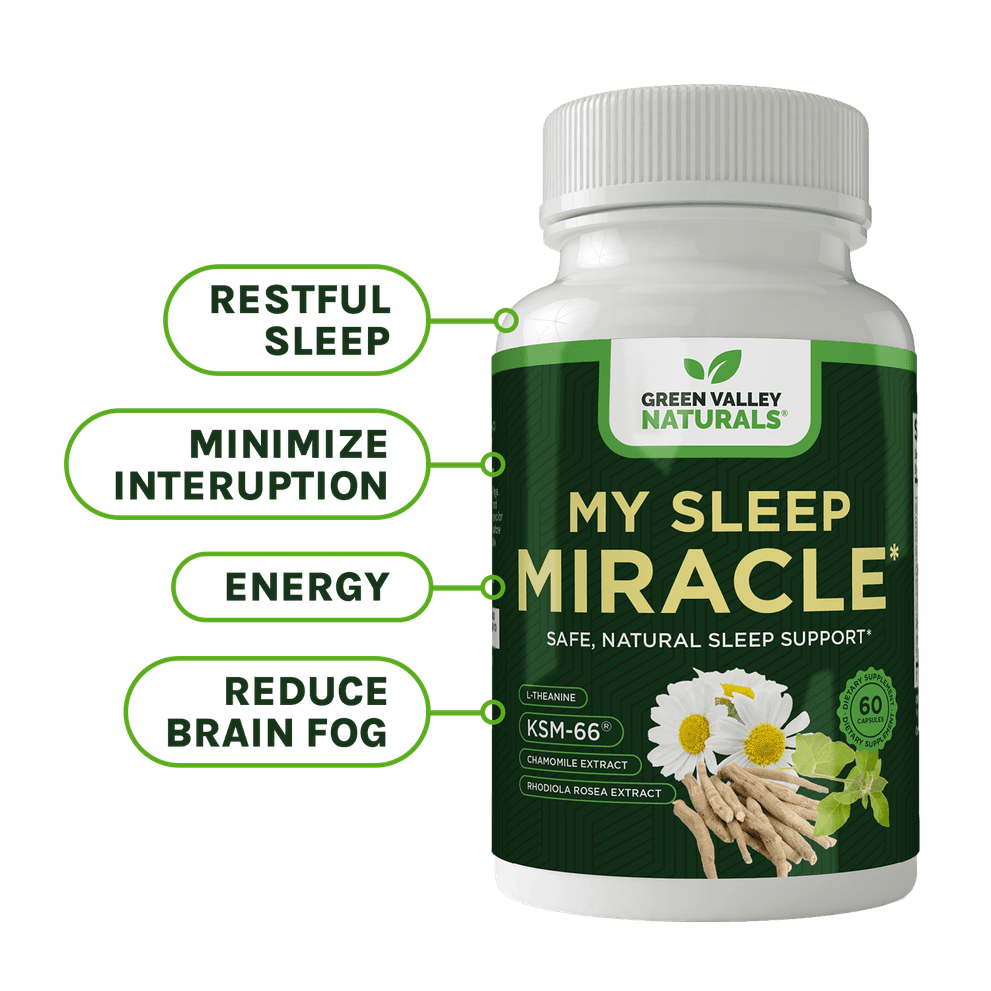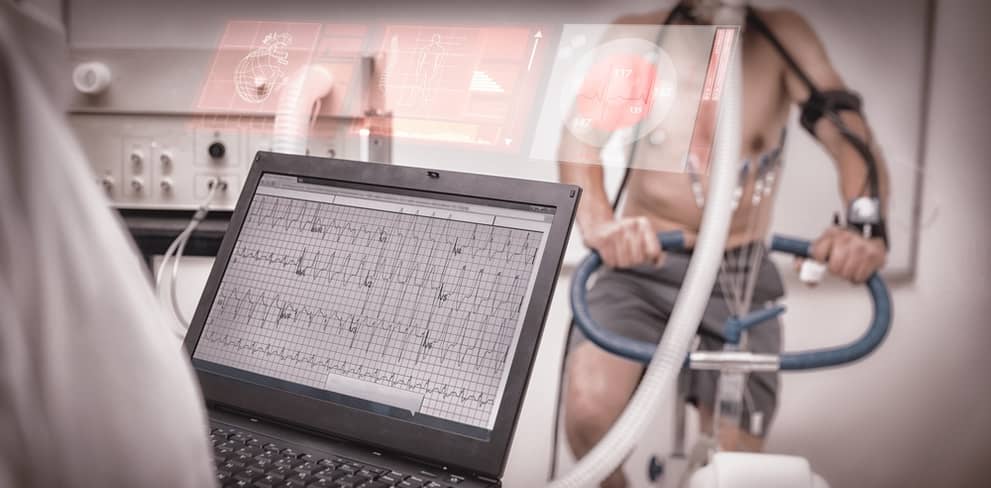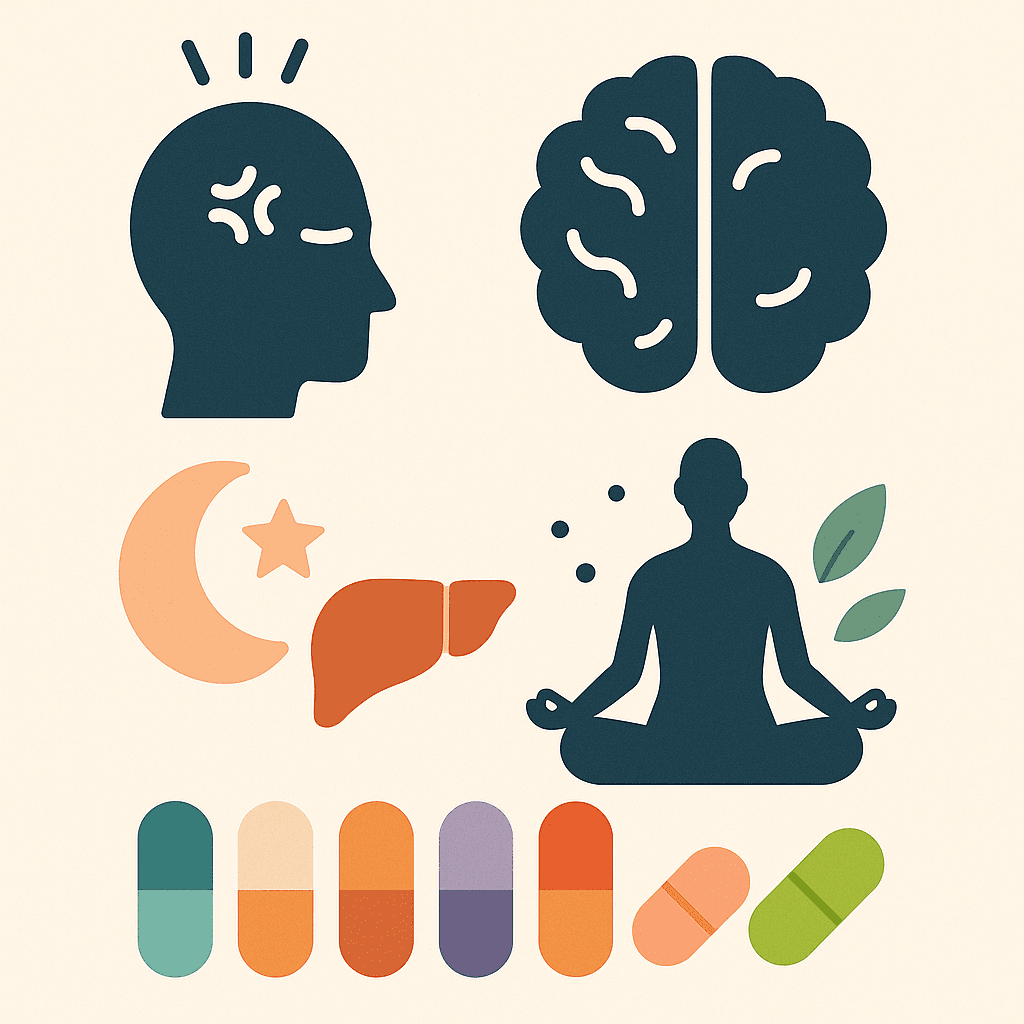
Stress might feel invisible, but its impact on your body and brain is anything but. From disrupted sleep and mood swings to anxiety, brain fog, and even liver damage, unchecked stress hijacks your health at every level. But what if the right natural supplements could help regulate your stress response, restore calm, and strengthen your body’s resilience—without side effects? In this science-backed guide, discover the top 6 supplements proven to fight stress and the one popular remedy you may want to avoid.
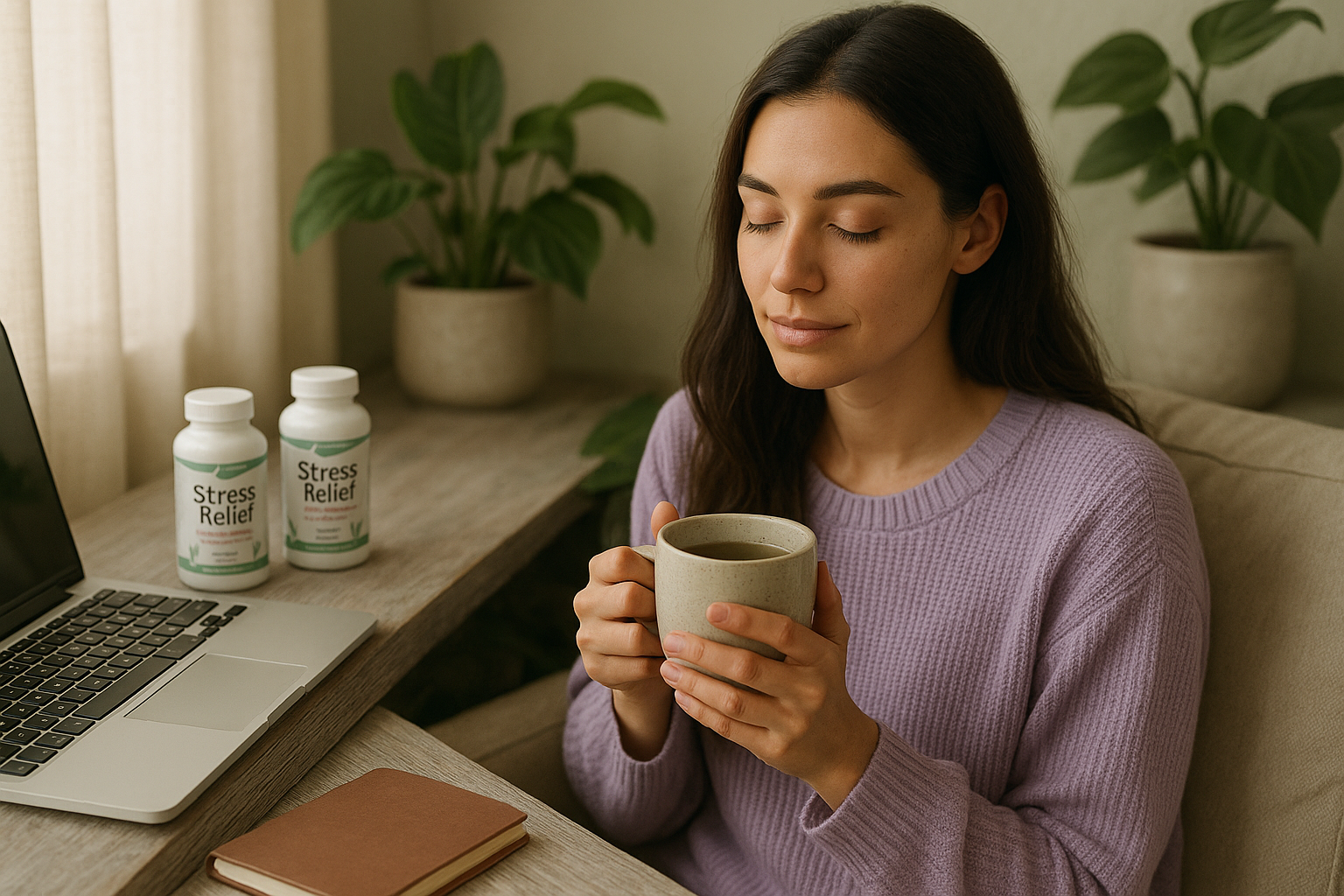
Key Takeaways
Chronic stress silently disrupts health by overloading the HPA axis and depleting nutrients—leading to anxiety, brain fog, poor sleep, and fatigue.
Adaptogens, amino acids, and vitamins each play unique roles in calming the mind and regulating the stress response. Together, they offer comprehensive support.
Smart supplement stacking + lifestyle changes like sleep, movement, and a healthy diet offer the best protection against long-term stress-related damage.
Beat the Burnout: What to Take When Stress Won’t Quit
Everyone knows it when they see it. But exactly what IS stress? And what happens to the body under stress?
Understanding stress and the stress hormones can help you manage it, and help you avoid the ravaging effects of anxiety, mood imbalances, poor sleep, liver damage, and all the other physical outcomes of stress -- and replace them with superior well being and joy.
In this post, we'll discuss stress hormone, what it does to the body and brain, and how to manage it through lifestyle changes and stress relief supplements that actually work, plus one to avoid.
Stress: Why It's Worse Than Ever...
Chronic stress has become a silent epidemic, affecting millions globally. Between demanding work schedules, nonstop digital notifications, financial pressures, relationship problems, and constant exposure to bad news, blue screens, and global instability, our bodies and minds are in a near-constant state of "fight or flight."
This relentless stress response floods the body with cortisol and adrenaline, which over time can disrupt sleep, digestion, immune function, and even brain health.
The National Institutes of Health defines stress as "a physical and emotional reaction that people experience as they encounter challenges in life." Needless to say, everyone encounters challenges. Alarmingly, more than one-third of people find their stress levels overwhelming most of the time, while 2/3 experience health effects due to stress -- including headaches, high blood pressure, poor brain function, and poor sleep quality.
Despite our safety, the wide availability of food (a lack of starvation), and modern homes and conveniences, we live with a high level of stress and need to learn how to reduce it if we expect our health journey to end well as healthy adults living into old age.
One problem is, we were wired to respond to threats that end quickly, like a bear chasing us. We're not doing well at distinguishing between life-threatening bear chases and daily stressors, such as traffic, bad news, work pressure, financial pressures, and troubled relationships.
Understanding Stress & the Body
When the body experiences a stressor — an event that causes stress and anxiety levels to rise — it triggers a stress response aimed at negating the threat through a series of physiological and behavioral changes.
The amygdala region of the brain sends a signal to the hypothalamus, which in turn activates the sympathetic nervous system, a part of the autonomic nervous system. This system controls involuntary functions such as breathing and heart rate.
The hormonal changes from this activation include a surge of adrenaline, which prepares the body to respond physically to the perceived threat, such as increased focus and reaction speed, higher blood pressure and heart rate, increased breathing speed, and decreased blood flow to nonessential organs. Think about it: These physical responses are exactly what you need to outrun a bear. However, it's not exactly helpful for 21st-century everyday stress, which seems never to end.
The central stress response system in your body is called the HPA axis -- short for hypothalamic-pituitary-adrenal axis. It's essentially a strategic communication network between your hypothalamus, your pituitary gland (located in the brain), and your adrenal glands, which sit on top of your kidneys.
When you're stressed, the hypothalamus signals the pituitary, which then tells the adrenals to release cortisol, your body’s primary stress hormone.
Cortisol helps regulate energy levels, blood pressure, the immune response, and mood. But when the HPA axis is hyper-activated long-term—as it is during chronic stress—it gets worn out. It contributes to fatigue, depression, insomnia, brain fog, mood disorders, hormone imbalances, and even metabolic problems.
Understanding the HPA axis is crucial for addressing stress at its root through supplements and lifestyle changes that support a healthy stress response.
Before discussing how supplements interact with brain chemistry and neurotransmitters to help reduce stress, let's identify some of today's many stressors.
Stress: Is it Good or Bad?
Scientists split stress into two categories -- "good" stress (called eustress), and "bad" stress ("distress"). Eustress can be beneficial and lead to increased engagement and personal growth. Distress is just plain distressing. Some stress is a combination.
Here are some examples of today's everyday stressors:
Moving
Financial strain due to rising cost of living, debt, economic uncertainty
Health concerns (chronic concerns, COVID)
Taking exams
Making a presentation at work
Attending a meeting with no agenda or purpose
Feeling stuck in a job you view as pointless
Going on a job interview
Long work hours with endless demands, unrealistic expectations, unfair pay, job insecurity
Relationship problems - family, friends, ex's
Getting an alarming text
Sleep deprivation
Poor nutritional status, environmental toxins
Slamming on the brakes to avoid an accident (& traffic congestion in general)
Divorce
Caregiving for the very young and the elderly
Death of a spouse or close family member
Storm destruction
Global uncertainty
And more. Travel can be eustress, but can also be stressful. As can most anything.
How you interpret your stress depends on who you are, what you've been through, the level of control you feel you have, and whether it's an ongoing threat. Every stressor has the potential to challenge your psychological well-being, and with it your sleep quality, mental clarity, and overall health.
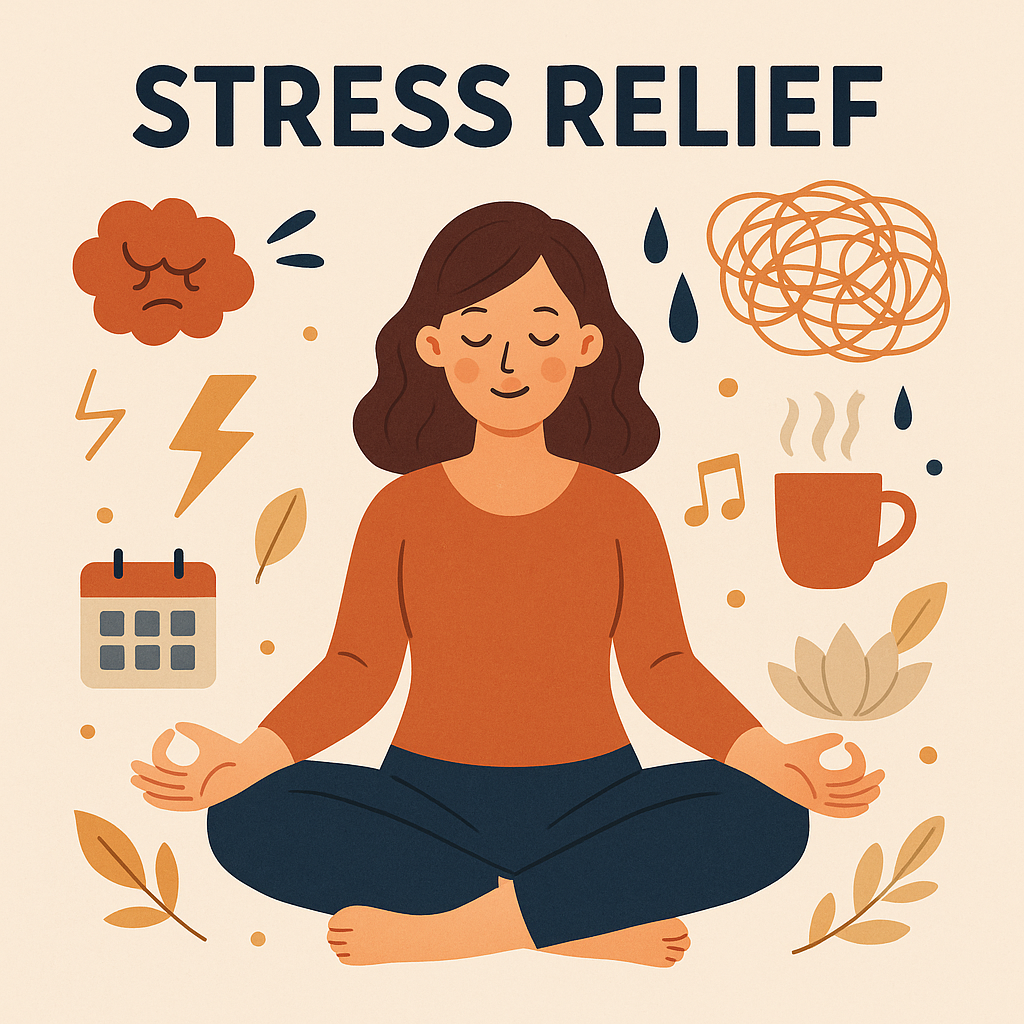
How Supplements Can Help (And Their Limits)
Calming supplements work by interacting with your brain's neurotransmitters, hormones, and stress response systems—particularly the HPA axis—to help calm body and mind.
Here's how stress-relieving supplements support brain chemistry:
Balancing Neurotransmitters
Some supplements boost calming neurotransmitters, such as GABA or serotonin. Examples:
L-theanine (in green tea) increases GABA and alpha brain waves, promoting relaxation without sedation.
5-HTP supports serotonin production, helping stabilize mood and reduce anxiety.
Regulating Cortisol
Too much cortisol over time leads to fatigue, anxiety, and brain fog. Adaptogenic herbs help control cortisol:
Ashwagandha
Rhodiola
Holy basil
Supporting Adrenal Function
Nutrients such as vitamin C, B vitamins, and magnesium support the adrenals, leading to better cortisol levels.
Improving Sleep & Recovery
Supplements like melatonin, magnesium glycinate, or L-glycine help calm the nervous system and promote restorative sleep, essential for recovering from chronic stress.
Reducing Inflammation & Oxidative Stress
Chronic stress promotes inflammation. Antioxidant supplements, such as curcumin, omega-3 fatty acids, and NAC, help protect brain cells and mitigate the damaging effects of stress.
Adaptogens vs Amino Acids vs. Vitamins
Adaptogens, amino acids, and vitamins differ in how they support the body's stress response:
Adaptogens -- Stress Modulators
Adaptogens are herbs or botanicals that help your body adapt to physical, emotional, or environmental stress. They:
Regulate the HPA axis and cortisol.
Promote balance without sedation or stimulation.
Improve resilience and recovery over time.
They're best for long-term stress resilience, adrenal support, and preventing burnout.
Examples:
Ashwagandha (calms/lowers cortisol)
Rhodiola (energy/reduces fatigue)
Holy basil (lifts mood/fights inflammation)
Amino Acids -- Mood Builders
Amino acids are building blocks of proteins and neurotransmitters. They:
Support neurotransmitter production - serotonin, dopamine, GABA, and norepinephrine
Balance mood, reduce anxiety, improve mental clarity
Amino acids are best for acute anxiety, mood swings, or cognitive stress when fast help is desired.
Examples:
L-theanine (boosts GABA and alpha brain waves for calm focus)
5-HTP or tryptophan (precursors to serotonin)
L-tyrosine (dopamine and norepinephrine precursor)
Vitamins -- Stress Support Nutrients
Vitamins are essential nutrients and micronutrients your body needs for overall health. They:
Fuel energy production, adrenal function, and nervous system regulation.
Protect against oxidative stress and inflammation caused by chronic stress.
Vitamins lay a nutritional foundation to buffer stress and prevent deficiencies that can ramp up anxiety or fatigue.
Examples:
B vitamins for adrenal and brain function (especially B5, B6, B9, B12)
Vitamin C for antioxidant and adrenal support
Vitamin D to support mood and reduce inflammation
Layering for Comprehensive Support
Type | Primary Role | Works Through | Best For |
|---|---|---|---|
Adaptogens | Balance stress hormones | HPA axis & cortisol regulation | Long-term resilience & adrenal support |
Amino Acids | Influence mood & focus | Neurotransmitter production | Mental clarity, mood, fast-acting stress relief |
Vitamins | Support physical resilience | Nutritional & metabolic support | Overall stress tolerance, adrenal & immune health |
Each plays a unique but complementary role—so combining them in a smart stack can offer layered, comprehensive stress support.
Is It the Supplement or the Placebo Effect?
The placebo effect is both a psychological and physiological response in which a person sees real improvements in their symptoms after receiving a treatment with no active therapeutic ingredient -- simply because they believe it will help. This highlights the powerful brain-body connection, and is especially evident in areas like pain, mood, and stress.
In the context of stress and stress relief supplements, the brain of someone who expects a supplement to calm them or boost their mood may in fact trigger a cascade of beneficial responses, such as an endorphin release or cortisol reduction, even before any active ingredient can take effect.
Does that mean the supplement is ineffective? Not necessarily. It does, however, suggest that both belief and biology can work in tandem to gain the perceived benefits. Quality stress relief supplements and herbal supplements with proven ingredients may work with the placebo effect to enhance the person's mental health, brain function, sleep quality as well as to lower stress.
Looking at the big picture, as long as the supplements you use are safe, there's certainly no reason to deny their benefits, even if part of the effect is due to the placebo effect. It'd be short-sighted to reject dietary supplements benefits such as relief from anxiety, insomnia, depression, and overall stress.
Top 6 Evidence-Backed Stress Relief Supplements
Nature provides us with many helpful evidence-based stress relief supplements... some of the best natural supplements for stress. Let's start with clinically studied adaptogens -- which, as noted above, help your body rebalance stress hormones.
1. Ashwagandha
What it is: Ashwagandha also goes by the names winter cherry and Indian ginseng. It's been part of Ayurvedic medicine for centuries.
How it works: Ashwagandha may reduce stress and anxiety. Other research suggests it may be helpful for improving sleep, translating to improved energy.
Clinical study highlights:
Reduced cortisol and perceived stress. According to a small 2012 randomized, double-blind, placebo-controlled study, the Ashwgandha group saw a 28% decrease in serum cortisol levels and enjoyed significantly reduced perceived stress and anxiety levels compared to placebo.
Improved sleep quality. A 2019 randomized, double-blind, placebo-controlled trial that was published found that in adults with insomnia, 300 mg of Ashwagandha extract twice daily for 10 weeks helped the Ashwagandha group fall asleep faster, sleep longer and more efficiently, and improved mental alertness upon waking. This was a small study with 30 in the Ashwagandha group and 30 in the placebo group.
Reduction in perceived stress, improved sleep quality and duration. Similarly, another well-designed but small study of 60 adults with high stress scores. There were two Ashwagandha groups, one of which got 250 mg and the other got 600mg daily. Compared to the placebo group, both Ashwagandha groups enjoyed reduced stress and improved sleep.
How to Use: Take as pill or capsule, or add powdered extract to smoothies. (Be forewarned... it's bitter.)
Dosage Range: 500 - 1,000 mg daily
Precautions: May lower blood sugar and blood pressure. Do not combine with diabetes or high blood pressure medications. May interact with thyroid medications. Consult with a doctor to see if your symptoms may be a thyroid problem in disguise. May cause sleepiness and slowed breathing; avoid using with sedatives.
Real use cases:
"Ashwagandha changed my life. I handle stressors better."
"Really helped me reduce anxiety naturally..."
Summary of Ashwagandha’s Benefits (Based on Studies):
Benefit | Evidence Rating | Key Outcome |
|---|---|---|
Cortisol Reduction | ★★★★☆ | 20–30% reduction in serum cortisol |
Stress & Anxiety Relief | ★★★★☆ | Significantly lower perceived stress (PSS score) |
Sleep Improvement | ★★★★☆ | Improved sleep onset, duration, and efficiency |
General Well-being | ★★★★☆ | Enhanced energy, mood, and morning alertness |
2. Rhodiola Rosea
What Rhodiola is: A flowering herb traditionally used to boost resilience, energy and mood. Considered an adaptogen - helps the body rebalance during stress to maintain health. Adaptogens are great because they give your body what it needs. For example, if your body needs rest, rhodiola can help calm your muscles and your mind so you can get it. On the other hand, if your body needs energy, rhodiola can deliver that, too by increasing your energy level.
How it Works: Helps modulate stress response and manage cortisol levels, supports neurotransmitters such as serotonin, dopamine, and norepinephrnie, boosts ATP production which promotes physical health and mental stamina.
Study Highlights:
Improved attention, accuracy, and reduced fatigue. According to a 2009 study published in Phytomedicine, these improvements were observed after two weeks of Rhodiola use among physicians working night duty.
Reduced stress and burnout. A study published in Phytotherapy concluded that Rhodiola supports people with stress-related fatigue, anxiety, and mild depression.
Improved athletic performance. More research suggests that Rhodiola may improve endurance and reduce perceived exertion in athletes.
How to Use: Take on an empty stomach before breakfast or lunch for more energy or at night to promote restful sleep. Again, it depends on what your body needs.
Dosage Range: Between 50 - 400 mg daily of extract standardized to 3% rosavins and 1% salidroside.
Precautions: May cause jitters or overstimulation in sensitive individuals. May interact with meds that affect dopamine or serotonin (for example, SSRI's). Not advised for people with bipolar disorder.
Real use cases:
"Rhodiola gave me a clean, calm energy without anxiety. Way better than coffee."
"Helped me bounce back during burnout -- less brain fog, more drive."
3. L-Theanine -- dubbed "the adaptogen of neurotransmitters"
What L-Theanine is: The biologically active constituent of green tea, widely studied for its ability to promote calm alertness without overstimulation. It's a popular stack with caffeine.
How It Works: Glutamate is the major excitatory neurotransmitter in your brain. It facilitates learning and memory. Low levels are linked with fatigue, "brain fog," and poor memory. Too much is just as bad as it can actually kill your brain cells, literally exhausting them to death. Glutamate imbalances are involved in many neurological diseases, including Alzheimer's, Parkinson's, Huntington's, depression, OCD, and autism.
You have a natural counter-mechanism to glutamate -- the amino acid gamma-aminobutyric acid (GABA). But many problematic conditions have symptoms of both elevated glutamate and insufficient GABA. That's where L-Theanine comes to the rescue by bringing glutamate into healthy balance. It works by:
Mimicking the calming effects of GABA, without needing sedation.
Increasing GABA production.
Blocking glutamate receptors.
May also promote serotonin (for mood, sleep, and appetite) and dopamine (reward, motivation, and mood regulation).
Study Highlights:
One study, a small 2019 placebo-controlled study, showed stress-related symptoms decreased, and cognitive scores improved after patients received four weeks of L-Theanine. The L-Theanine was safe and well-tolerated.
Some studies suggest that L-Theanine may increase alpha waves in the brain associated with relaxation and selective attention, reduced stress and anxiety, and improved sleep quality.
A noteworthy study published in the Journal of Clinical Psychiatry found that participants consuming L-theanine had significant reductions in anxiety during stressful situations compared to those receiving a placebo.
A 2007 double-blind study published in Biological Psychology found L-Theanine reduced psychological and physiological stress responses. Participants were stressed with a series of mental arithmetic problems. Twelve participants each went through 4 separate trials: (1) taking L-Theanine at the start, (2) taking L-Theanine at the midpoint, (3) taking placebo and (4) taking nothing. L-Theanine reduced heart rate and immunoglobulin response.
How to Use: Capsules, tablets, gummies, powder, sublingual drops, or combinations.
Dosage Range: Take 100-200 mg daily. Consider cycling on and off, so your body stays sensitive to it. Some people take up to 400 mg for sleep at night.
Precautions: L-theanine is well absorbed from the intestine and passes the blood-brain barrier, with effects noticeable within 30 minutes and still measurable five hours later. It has a good safety profile based on toxicology studies. L-Theanine was approved in Japan in 1964 for unlimited use in all foods (except infant foods) including chocolates, soft drinks, and herbal teas.
Speak to your healthcare provider before taking during pregnancy and lactation, as studies are lacking. L-Theanine may interfere with drugs for blood pressure, ADHD, and caffeine supplements.
Real Use Cases from Reddit:
"I could cry tears of happiness. I slept great through the whole night and woke up in the morning without anxiety for the first time in a month. Not only in the morning- but the entire day I felt so much more at ease and happier!"
"It stops coffee anxiety for a fact. I never drink coffee without it or I will have anxiety attacks."
"Has changed the quality of sleep I get, dramatically."
4. Magnesium (Glycinate or Citrate)
How it Works: Magnesium plays a crucial role in the nervous system, helping to regulate neurotransmitters like GABA, which helps calm the brain, nervous system, and body. Magnesium also aids in melatonin production, muscle relaxation, and regulation of the HPA axis (the stress response system).
Magnesium regulates hundreds of functions in your body. So it should come as no surprise that low magnesium levels are linked to insomnia, anxiety, and restless sleep. Dietary intake is often low in the standard American diet, making supplements a helpful addition. Also, consider food sources such as pumpkin seeds, nuts, leafy green vegetables, and fatty fish.
Types of Magnesium: Magnesium supplements come in many types, which adds to the confusion about picking one. Three of the most common types are:
Magnesium glycinate -- magnesium bound to glycine -- a calming choice.
Magnesium citrate -- magnesium bound to citric acid -- for calm and colon (it's a laxative)
Magnesium oxide -- magnesium bound to oxygen -- common, but not helpful for stress or sleep. Also has very poor absorption, so best to avoid.
Benefits of Magnesium Glycinate:
Supports deep, restorative sleep
Reduces anxiety and nervous tension
Gentle on the GI tract
May help reduce muscle cramps or restless legs.
Best for people with sensitivity to laxatives, and those who have trouble falling and staying asleep.
Dosage: 200-400 mg elemental magnesium/day. Use split doses.
Benefits of Magnesium Citrate:
Reduces tension, supports relaxation
A mild laxative, helpful for constipation-related sleep disruption
May cause GI upset at higher doses.
Best for people who need both calm and regularity.
Dosage: 200-300 mg in split doses.
Scientific Evidence:
A 2012 double blind placebo-controlled study of 46 elderly subjects found that magnesium supplements improve subjective measures of insomnia such as insomnia severity index score, sleep efficiency, sleep time and sleep onset latency, and early morning awakening. Also objective measures such as concentration of serum renin, melatonin, and cortisol in elderly people.
A 2017 study published in the Journal of Magnesium Research found that 400mg of magnesium glycinate before bedtime significantly improved sleep quality and reduced daytime fatigue in older adults struggling with insomnia.
A study published in the Nutrition Journal demonstrated that 300mg of magnesium glycinate daily for 8 weeks improved sleep quality, reduced anxiety, and enhanced daytime energy levels in individuals with chronic sleep complaints.
Real Use Cases:
"This supplement changed my life... helps with my anxiety so much. I take it about an hour before bed each night."
"I also had a severe magnesium deficiency. I was exhausted, anxious, unable to settle my thoughts... The first night I took magnesium, I immediately felt better. No joke. Like a light-switch. Took a few more weeks to get all the benefits, but I swear by magnesium glycinate.
"I've measured my diet down to the gram, and it's virtually impossible to get the RDA of magnesium without a supplement."
5. Lemon Balm & Passionflower
What It Is: Calming herbs from the mint family, often used together.
How It Works: Supports relaxation, eases anxiety, promotes sleep.
Study Highlights:
Two weeks of 1,000 mg lemon balm capsules per day showed a significant decrease in symptoms of stress such as heart palpitations, but not the severity of symptoms. Anxiety, sleep problems, and depression were greatly reduced after lemon balm.
Several studies have been interested in exploring the sleep-enhancing effects of lemon balm alone and combined with other herbs. Women in menopause greatly improved sleep quality after 4 weeks of 160 mg daily lemon balm, coupled with 320 mg valerian, versus placebo.
Several studies found sleep improvements in children, middle aged adults, and older adults, although several studies combine lemon balm with other herbs.
Dosage: 300-600 mg once or twice daily. Or as a tea. Good for evening use.
Precautions: May cause drowsiness -- avoid driving after your first few doses to assess. May affect your thyroid; check with your doctor first. Get medical guidance for long-term use. Can interact with sedatives, thyroid meds, or barbiturates.
Real Use Cases:
"Lemon balm tea in the evening has become my ritual. Calms me instantly without making me groggy." - r/Herbalism
"I've used lemon balm capsules before a big presentation. My nerves settled within 30 minutes." r/Nootropics
6. Omega-3 Fatty Acids
What it is/How It Works: Omega-3 fatty acids, especially EPA and DHA, give notable benefits for stress relief and sleep, backed by clinical research and user testimonials.
Omega-3s modulate stress hormone levels of cortisol and adrenaline, influence the HPA axis, and support neurotransmitter function. Also increase melatonin to improve sleep quality.
Study Highlights:
A 2011 study from Brain, Behavior, and Immunity found that medical students taking 2.5g of omega-3s daily had 20% lowered anxiety and inflammation vs. placebo.
A 2014 randomized trial in Journal of Sleep Research showed that children supplementing with 600mg DHA daily had far less sleep disturbances and longer sleep duration. Adults in similar studies also report modest improvements in sleep quality.
Dosage: 1,000-2,000 mg combined EPA + DHA daily for general stress relief. Clinical studies often use 2,000-2,500 mg/day.
Best Sources: High-quality triglyceride-form fish oil, krill oil, or alternatively, vegan algal DHA
Real Use Cases:
"I didn't expect sleep benefits, but after a couple weeks, I realized I was waking up WAY less at night."
"Omega-3 has been a real game-changer for me. Had an almost mind-blowing effect. I just feel a deep sense of well-being that I can't place."
What Supplements To Avoid?
Kava (Use With Extreme Caution)
What it is: A root from the South Pacific known for its calming effects.
How It Works: Inhibits GABA receptors in the brain, promoting relaxation, reducing mental tension, and improving sleep, without impairing cognition.
Study Highlights:
A 2003 randomized placebo-controlled trial published in Psychopharmacology found kava extract significantly reduced anxiety scores without withdrawal or dependency.
A 2013 review in Cochrane Database noted potential efficacy for generalized anxiety disorder (GAD), but it called for more rigorous studies.
Dangers and Precautions:
Despite Kava's stress-relieving benefits, it carries serious risks, among them:
Liver toxicity. Especially when extracted with alcohol or used excessively. Many liver failure cases have been reported globally, but it is not known how many of them involved improper preparation or pre-existing liver damage.
Drug interactions: Sedatives, antidepressants, anti-seizure meds, and alcohol.
NOT for long-term use! Experts recommend short duration only (1-3 months) and only water extracted products which are gentler on the liver.
Despite its reputation as a fast-acting herbal remedy for stress and anxiety, it must be used cautiously and always under guidance from a healthcare provider.
Before using, be sure to check regulatory status in your jurisdiction, as it has been banned in some locations, although regulations are subject to change.
How to Choose the Right Supplement for You
So, how do you choose the right dietary supplement to help you reduce anxiety and improve mental health?
Third party testing. Third party testing helps you verify that it contains the ingredients it claims to, and is always a smart safety strategy when shopping for supplements, regardless your end goal. GMP certification is also a form of third party testing as it requires companies to jump through additional hoops to ensure quality supplements.
Work with your healthcare professional. Especially if they're integrative or holistic. They can help assess your individual needs, may know better who the "bad actors" in the industry are, and can monitor health markers like cortisol for improvements.
Research for yourself. Go to PubMed and see what the research says for yourself.
Know your personal preferences. If you hate tablets and can't swallow them, that will inform your decisions. Vitamins come in many forms today -- capsules, tablets, gummies. Don't sabotage your stress levels taking treatments or supplements increase your stress. As with all new supplements, start with a lower dose and see how your body responds.
Keep your end goal in mind. Know what you want to accomplish. Is it focus or sleep or calm? Keeping a journal is one way to measure your results. Keep track of how your sleep improves. Use apps if desired. Apply the principle, "Fool me once, shame on you. Fool me twice, shame on me." It's up to you to keep track of how well your dietary supplements serve your health.
Combine Supplements with Lifestyle for Best Results
Stress may often feel out of our control. But we can improve our response to stress with smart lifestyle actions that are often within our control and definitely play a role in keeping us balanced. Supplements play a key and central role. But a healthy diet, nutrition, and physical exercise are pivot points many people forget about during their stress.
While your doctor probably won't take the time to remind you of this, research is replete with ample evidence that lifestyle factors do matter. And they represent a great starting point.
So what are the most important lifestyle factors?
A Mediterranean diet or MIND diet, which focus on whole food nutrition and essential nutrients, and vitamins and minerals such as magnesium that contribute to overall health. Supplements are worthless if you're eating inflammatory foods every day.
Physical exercise helps reduce stress and anxiety. Reduces cortisol, boosts endorphins, improves sleep and mood, provides a mental break from daily worries, and improves resilience to future challenges.
Mindfulness and relaxation techniques including meditation, yoga, and breathing exercises can help reduce the "fight or flight" panic attacks.They help you relax and lower the heart rate and blood pressure.
Sleep practices, consistent sleep times and keeping your room cool, dark, and uncluttered.
Social connections with friends and family. A professional doctor or therapist can help, if you're feeling down or overwhelmed from a stressful situation. There's no shame in finding a professional who can help you find balance again.
Sun exposure provides essential vitamin D, and can also improve mood. Think how refreshed and energetic you feel when the sun returns after a week of rain. Fortunately it doesn't require a doctor's prescription. It's free for the taking (unless you live in Alaska during the winter), in which case light therapy can help.
Music therapy, aromatherapy, and laughter therapy.
Supplements including adaptogens, amino acids, and vitamins are a valuable support tool to improve nutrients, especially in a day when depression, anxiety, and stress are at epidemic levels. Supplements are non-addictive and most adults can take them without side effects.
Summary
Chronic stress is wreaking havoc on modern health—fueling anxiety, poor sleep, fatigue, and inflammation. But research shows that certain evidence-based supplements can support your body’s stress response by regulating cortisol, boosting mood, and enhancing sleep. Adaptogens like ashwagandha and Rhodiola, amino acids like L-theanine, and key nutrients such as magnesium and omega-3s all work in distinct but complementary ways to restore balance. When paired with smart lifestyle choices, these natural stress relief supplements can help you relax, recover, and renew from the inside out.
Frequently Asked Questions
What's the best stress relief supplement?
The best stress relief supplement often includes adaptogens like ashwagandha, L-theanine, or magnesium glycinate, which help regulate cortisol and calm the nervous system without sedation.
Which supplement works best for sleep and stress?
A combination of magnesium glycinate, L-theanine, and calming herbs like lemon balm or passionflower supports stress reduction and improved sleep quality.
What’s the fastest acting stress-relief supplement?
L-theanine is one of the fastest-acting stress supplements, often working within 30–60 minutes to promote calm.
How to reduce anxiety naturally?
Reduce anxiety naturally through daily exercise, breathing, healthy sleep, and supplements like ashwagandha, magnesium, and Rhodiola—all of which support nervous system balance.
Are these safe for long-term use?
Most stress-relieving supplements like ashwagandha, magnesium, and L-theanine are considered safe for long-term use when taken as directed, but it’s best to consult a healthcare provider before starting new supplements. Kava relieves stress, but comes with some dangers.
